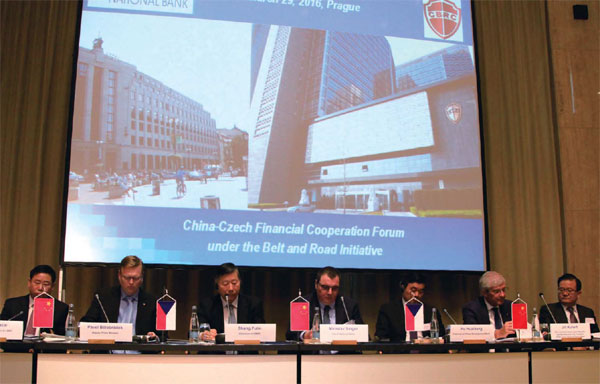Banking on the Belt and Road
Financing for Eurasian connectivity and Central and Eastern European productivity are on the agenda for Prague and Beijing, cooperation forum hears
Financial institutions from China and the Czech Republic want to turn the European country into a financial hub by supporting the production of regional goods and services, as well as projects under the Belt and Road Initiative, which aims to boost Eurasian connectivity.
Banking industry leaders talked about their intentions on March 29 at the China Czech Financial Cooperation Forum under the Belt and Road Initiative. It was held during the three-day Czech visit of President Xi Jinping, who flew to Washington on March 30 to attend the World Nuclear Security Summit. The forum was organized by the Czech National Bank and the China Banking Regulatory Commission.
|
Banking industry leaders gathered on March 29 at the China Czech Financial Cooperation Forum under the Belt and Road Initiative. Jiang Shan / China Daily |
On the same day, three financial cooperation agreements between China and the Czech Republic were signed. The countries' financial regulators agreed to collaborate on cross-border crisis management.
In addition, the China Banking Association and the Czech Banking Association agreed to enhance knowledge-sharing, banking industry research and training. Bank of China and the Czech financial and investment firm PPF Group also agreed to extend their strategic cooperation.
Pavel Belobradek, deputy prime minister of the Czech Republic, says China is an important partner, not only in financial flows, but also in supervision and regulation of financial systems.
Gao Yingxin, executive vice-president of the Bank of China, says there is great potential for growth in trade and investment cooperation between China and the Czech Republic and other Central and Eastern European countries under the Belt and Road framework, which can be supported by financial services providers.
Gao says the room for financial services growth is reflected in four key areas. First are the many infrastructure projects linking China and Central and Eastern European countries that need financing.
The highly complementary comparative advantages of China and the Czech Republic are second, meaning great potential for strategic partnerships and accompanying financing. Gao says the Czech Republic's strengths include biotechnology, environmental protection technology and beer production, and China's strengths include mechatronics, chemical engineering, machine tools and high-speed railways.
Third, increasing bilateral exchanges of visitors, especially tourists, between China and the Czech Republic are creating a huge market for personal financial services support.
Fourth, the internationalization of China's currency, the renminbi, and its increasing use along Belt and Road countries can be supported through financial organizations.
Bank of China established a branch in Prague in September, the same year it was announced that the bank would commit 100 billion yuan ($15.4 billion; 13.6 billion euros) within three years to support Belt and Road development.
Hou Wenbo, general manager of the Prague branch, says the bank is talking with 20 to 30 companies and organizations about cooperation, and has made loans to companies working in infrastructure, technology and machine tools.
Hu Huaibang, chairman of China Development Bank, says long-term vision is crucial to Chinese financial organizations' lending strategy for projects related to the Belt and Road Initiative, because such projects often require large capital commitments at early stages and the payback period often is lengthy.
Gao says the development of innovative and comprehensive financing, renminbi internationalization, and market-driven sustainable financing are all important for financial organizations to service initiative-related projects.
China's trade and investment relationship with the Czech Republic has grown rapidly in recent years, and in 2015 bilateral trade reached $11 billion. The Czech Republic became one of the earliest CCE countries to sign an agreement with China on initiative cooperation, at the fourth Summit of China and Central and Eastern European Countries, in November 2015 in Suzhou.
Many Czech firms are also embracing new opportunities created through the initiative, including the PPF Group, which has provided consumer finance to customers in 24 provinces and 274 cities in China since its consumer lending arm Home Credit's entry into China in 2004. Last year its new business volume reached 18.7 billion yuan.
"The Belt and Road Initiative is characterized as win-win cooperation. Home Credit has been honored to serve Chinese consumers and help bring expertise in risk management and other technologies to the market. In return we have learned a lot from the Chinese market," says Mel Carvill, director and board member of PPF and Home Credit.
Contact the writers through cecily.liu@chinadaily.com.cn



















